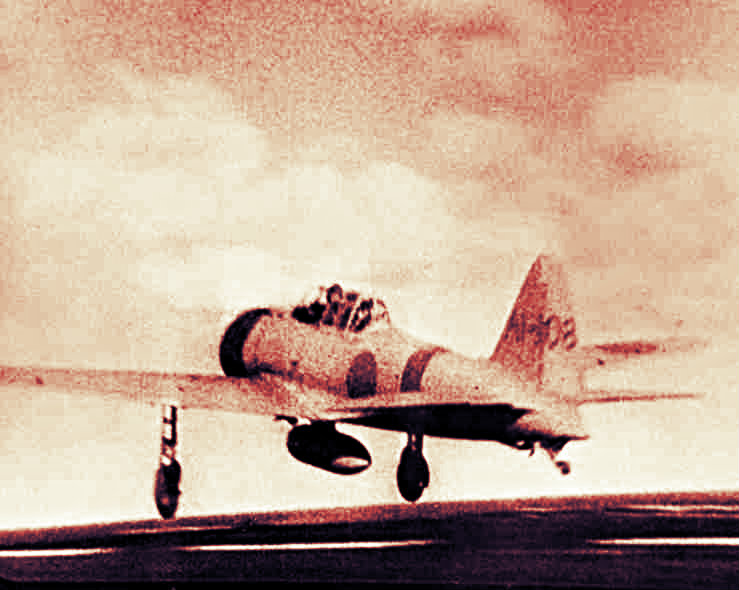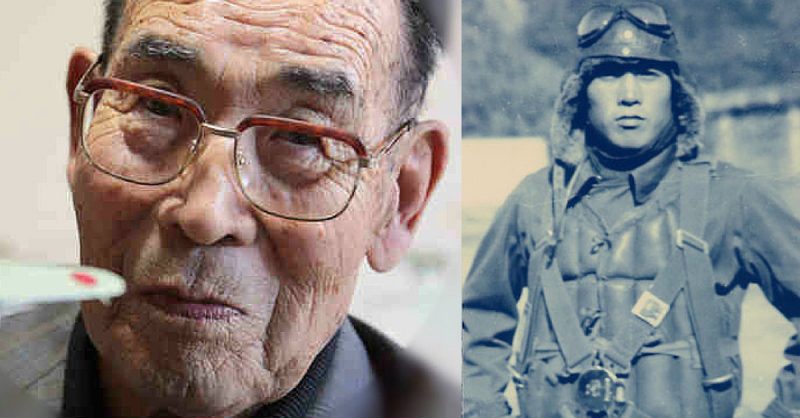“Nothing is as terrifying as war,” retired Japanese Zero fighter, Kaname Harada, stressed out. In a speech he gave out recently, the former Zero fighter warned Japan about ever thinking of going to war again using the horrible wartime experiences he went through to shed a negative light on this thought.
Japan going to war has become a timely issue in the country after Japanese conservative Prime Minister Shinzo Abe called for the revision of Japan’s pacifist Constitution.
Asked to speak in a gathering of about 200 tax accountants along with their business clients in the city of Nagano, the now frail 98-year-old former Zero fighter pilot hang a sepia-toned fierce-looking photo of himself in his younger days along with hand-drawn maps before facing the audience and speaking to them in a voice filled with strength and conviction.
Mr. Harada, then, went on recount his battle experiences – which spanned from the attack of the Pearl Harbor to the battles at Midway and Guadalcanal – in the next 90 minutes emphasizing in every point that he could that he was doing so to inform Japan’s younger generations so “they won’t have to go through the same horrors” as he did.
The once feared “samurai in the sky” fears that the Japanese people may not be able to hear the same warning he gave in that said gathering soon as the number of those who were firsthand witnesses of the Second World War and its devastating effects and those who really fought in it in the country is dwindling.
It can be remembered that WWII started in Asia when Imperial Japan invaded northeastern China in 1931. The invasion and occupation of the former in the latter resulted to the deaths of over tens of millions of individuals in the course of 14 years.
His Story
The former Zero fighter described himself as “the last Zero fighter” or in the least, the last surviving pilot who flew the aircraft in its glory days against the United States early WWII.

He recalled how he flew close to his opponents during dogfights and how he saw their terror-stricken faces before gunning them and their aircraft down to their deaths. he also said that he was able to meet and even befriend some of his enemies after the war. Like him, they had been fathers and sons, individuals who he felt no hatred against or even know.
“That is how war robs you of your humanity by putting you in a situation where you must either kill perfect strangers or be killed by them,” he pointed out in an interview with New York Times after his speech.
Mr. Harada’s talks are vivid, describing how Imperial Japan ruled the Pacific skies even for just a short while during the Second World War. They’re rich with stories, accounts from his own experience as a formidable Zero fighter.
He recounted his victories — shooting down five US torpedo planes during the Battle of Midway in 1942 in one single morning as he was defending the Japanese fleet and how he outmaneuvered American tail gunners.
He also recounted his defeats — how he had to ditch his plane at sea because all of the four aircraft carriers Japan sent to Midway got lost in the battle that turned the tide around in favor of the Americans and how he got shot down in the island of Guadalcanal four months after that. His plane crashed in the island’s jungles and he survived. But his arm got severely mangled he was never able to come back as a Zero fighter again. Instead, he spent the rest of WWII as a pilot trainer in Japan.
He went on to say that after WWII ended, he spent his time hiding from what he believed vindictive American occupiers. But the Americans extracted vengeance from him in a different way — through the nightmares that plagued him and left him sleepless most nights. In these horrible dreams, Mr. Harada said, he could see the terrified faces of the American pilots he had shot down during the war.
“I realized the war had turned me into a killer of men and that was not the kind of person I wanted to be.”
The nightmares finally stopped plaguing him and along with it the gnawing guilt he carried when he found a new calling — the establishment of of a kindergarten in Nagano way back in 1965. He dedicated himself to teaching small children the true value of peace and now that though he’s retired, he said that he still takes time to visit the school everyday just so he could see the smiling faces of the children.
The former Zero fighter also was not a keen speaker of his wartime experiences at first. AS a matter of fact, he chose not to speak openly about that part of his life at all. It took him many years after the end of World War Two before he opened that certain chapter in his life. His turning point — the Persian Gulf War in 1991.
According to him, he overheard some young Japanese talked about the said war and were describing the bombings as if they happened in some “harmless video games”. Feeling disconcerted, Mr. Harada resolved to share and speak out about the war and how terrible it could be when one is caught up in it.
The Fears of Passing
The former Zero pilot is afraid that with each passing away of an aging Japanese veteran, so will their stories pass away with them. He pointed out that each veteran’s death results to Japan losing more than just an eyewitness to the war as according to him, it is his generation’s bitter war experiences and their aversion to war that kept Japan in a pacifist path firmly since WWII ended.
Though he avoids to wade into the country’s politics, Mr. Harada did allude to its recent leaders’ being too eager to discard the country’s renunciation of war as well as their forgetfulness at the great accomplishments brought about by the country being at peace after the war.
His sentiments are shared by many in Japan. In was just February of this year when Japanese Crown Prince Naruhito himself spoke out about passing down history correctly -even the tragic ones – to Japan’s younger generation who have no direct experience and knowledge of it.
Though Mr. Harada has been diagnosed with throat cancer and had, one time last year, collapsed in a bathroom after a speech, he vowed never to stop talking and sharing his wartime experiences as dark as they may seem.
“Never forgetting is the best way to protect our children and our children’s children from the horrors of war,” he said.
https://youtube.com/watch?v=mL0bguWfBL4
